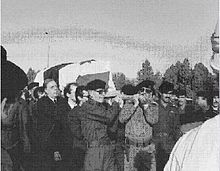Michel Aflaq
Michel Aflaq (also Aflak , Arabic ميشيل عفلق Mischil Aflaq , DMG Mīšīl ʿAflaq ; * 1910 in Damascus ; † June 23, 1989 in Paris ) was an Arab politician and co-founder of the Ba'ath Party . He is considered one of the masterminds of Arab nationalism and Arab socialism .
Life
Aflaq was born into a Greek Orthodox Christian family. In the early thirties he studied at the Sorbonne in Paris. In 1943 he founded the Baʿth party together with Salah ad-Din al-Bitar and prescribed a strictly secular orientation. In 1949 he became Syrian Minister of Education for a short time.
In Syria
Aflaq fled the new regime in Syria under the ruler Adib al-Shishakli to Lebanon in 1952 , from where he returned in 1954 to take up the post of minister of education. Disappointed with the United Arab Republic , which he initially supported , he fled to Lebanon in 1959, and from then on left Baathists and Baathist military officials repeatedly questioned Aflaq's leadership role. In 1964 Aflaq therefore spent six months with his brother in Bonn. After the Ba'ath founders were ousted by a left-wing neo-Ba'ath party in Syria in 1966, he fled again with Bitar to Lebanon, after the Arab defeat in the Six Day War in 1967 he emigrated to Brazil .
In Iraq
Between 1968 and 1974 he went to Baghdad several times . Although he left Iraq several times until 1974, u. a. in the dispute over Iraq's failure to intervene in the Jordanian civil war in 1970/71, the Iraqi-Soviet friendship treaty of 1972 and the coalition of the Baathists there with the communists in 1973, but returned to Iraq in 1975. There he was highly respected as chairman of the Ba'ath National Command (deputy was initially his close comrade in arms, Shibli al-Aysami ) and Iraqi vice-president, but remained without real influence. As he got older, he increasingly left the ideological party work to his close colleague Elias Farah . On the 40th anniversary of the founding of the Ba'ath Party, he was officially honored in Baghdad in April 1987.
Religious affiliation

According to Aflaq's son Iyad, his father is said to have thought of converting from Christianity to Islam for the first time in 1980. Shortly before his death, Aflaq is said to have converted - a claim that, according to unspecified Western diplomats, was later questioned by Aflaq's family. According to the German orientalists Martin Robbe and Gerhard Höpp , the reason for Aflaq's conversion was the pan-Arab orientation of the Ba'ath founder, who pays homage to Islam as an Arab national heritage. However, referring to Aflaq's unspecified family members, the Berkley Center at Georgetown University in the United States describes the conversion as a means of Saddam Hussein to separate Baathism from Christianity . Iraqi President Saddam Hussein organized a media-effective Islamic state funeral at which he himself carried the coffin and which was also broadcast by the media in other Arab countries, but not in Syria.
Works
- Eternal message of the Arab nation. Speech in memory of the Arab prophet. In Andreas Meier Hg .: The Political Mission of Islam. Programs and Criticism between Fundamentalism and Reforms. Original voices from the Islamic world. Peter Hammer Verlag , Wuppertal 1994 ISBN 3-87294-616-1 pp. 122-133 (with introduction of the ed. - Original 1943. Newer source: Fī sabīl al-ba'ṯ. Beirut 4th ed. 1970, p. 127–138)
literature
- Bassam Tibi : From the kingdom of God to the nation state. Islam and Pan-Arab Nationalism. Suhrkamp, Frankfurt 3rd edition 1987 ISBN 3-518-28250-6 p. 189 ff. (Excursus on Aflaq)
- Sami M. Moubayed: Steel & Silk - Men and Women who Shaped Syria 1900-2000 , pages 130-135. Cune Press, Seattle 2006
- The International Who's Who 1988-89. 52nd edition. Europa Publishing, London 1988, ISBN 0-946653-42-9 , p. 12.
Web links
- Al Jazeera of February 12, 2008: Founding an Arab brotherhood
Individual evidence
- ↑ Peter Scholl-Latour : Arabien's Hour of Truth , Ullstein, 2012, p. 302.
- ↑ alarabiya.net
- ^ Günter Kettermann: Atlas for the history of Islam. Primus Verlag, Darmstadt 2001, ISBN 3-89678-194-4 , p. 164.
- ↑ a b Martin Robbe , Gerhard Höpp : World of Islam - History and everyday life of a religion , page 149. Urania-Verlag, Leipzig / Jena / Berlin 1988
- ^ Harris, William: Challenges to Democracy in the Middle East . Markus Wiener Publishers, 1997, ISBN 978-1-55876-149-0 , pp. 39 ( limited preview in Google Book search).
- ↑ Michel Aflaq. (No longer available online.) Georgetown University , archived from the original on July 29, 2013 ; Retrieved December 21, 2011 .
- ^ Shair, Kamal: Out of the Middle East: The Emergence of an Arab Global Business . IB Tauris, 2006, ISBN 978-1-84511-271-4 , pp. 39 ( limited preview in Google Book search).
| personal data | |
|---|---|
| SURNAME | Aflaq, Michel |
| ALTERNATIVE NAMES | Aflak, Michel |
| BRIEF DESCRIPTION | Arab politician and co-founder of the Ba'ath party |
| DATE OF BIRTH | 1910 |
| PLACE OF BIRTH | Damascus |
| DATE OF DEATH | June 23, 1989 |
| Place of death | Paris |
